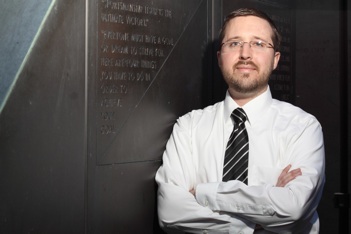 As a professor of political science at Elizabethtown College, director of the school’s pre-law program and its newly appointed director of the Honors Program — and president-elect of the Northeast Association of Pre-Law Advisors (NAPLA), you’d think Kyle Kopko is all about getting students into law school. In reality, he’s more interested in ensuring a good career fit.
As a professor of political science at Elizabethtown College, director of the school’s pre-law program and its newly appointed director of the Honors Program — and president-elect of the Northeast Association of Pre-Law Advisors (NAPLA), you’d think Kyle Kopko is all about getting students into law school. In reality, he’s more interested in ensuring a good career fit.
“Sometimes law school isn’t the best option,” he said in a recent phone interview, adding that good advising means helping students find their true calling and knowing that this is just as important as helping get someone into law school.
You don’t just help students go off to law school, you find out if law school is the most appropriate option.”
Kopko, a 2005 Elizabethtown College Honors graduate, will take over the reins at NAPLA in September. NAPLA, the oldest and largest of the six regional pre-law advising associations, was founded in 1973 and incorporated in 1984. It maintains a membership of about 400 undergraduate pre-law advisors from schools in the northeast and throughout the nation, along with representatives from most ABA-approved law schools in the country.
NAPLA members, Kopko said, advise at colleges and universities from Virginia to Maine.
Presently, the organization’s goals are to advocate for the interests of pre-law undergraduate students and institutions in the counseling and admissions process leading to law-related careers. NAPLA also wishes to improve the skills of pre-law advisors and develop and increase lines of communication between and among pre-law advisors, law school admissions officers and other law-related organizations.
As Kopko takes the lead, he aims to also introduce a four or five-year strategic plan in coordination with the organization’s board of directors. The plan will examine the expansion of member benefits, the governance structure of the organization, development of a practicum to educate pre-law advisors and partnering with other organizations—American Bar Association, NACADA, for instance—for networking.
The yearly NAPLA conference is three or four days of sessions for new law advisors—how to advise about writing a personal statement and how to help students develop competency beyond law material, such as soft skills for interviewing—and open sessions for those who have been members for a number of years.
At the least, said Kopko, NAPLA is great networking. Kopko, himself, has visited law schools across the country to see, firsthand, what their programs are like and it gives him the opportunity to get to know law school administrators from all over. “It’s a huge benefit for our students who might be interested in health law or energy law. I’ve met professors in those areas and can suggest that maybe the student sits in on a class during a law school visit.”
After graduating from Elizabethtown, Kopko earned his own doctoral degree in political science with a specialization in judicial politics and constitutional law from The Ohio State University in 2010. His teaching and research interests include American politics, election law, constitutional law, judicial behavior, political psychology and religion and politics. He has published articles in Election Law Journal, Judicature, Political Behavior and Presidential Studies Quarterly.
He has been an advisor for six years, talking to Elizabethtown College students about tuition, scholarships, how much it costs to live in certain cities, paying off loans, why they are interested in law school and what they hope to do with their careers.
“Some tend to think that you get a law degree and change the world by changing policy,” he said of a variety of students he speaks with. “Maybe you can through the government or a non-profit; maybe they’d be better off with a public policy or public administration degree.”
This is where true advising comes in.
“You don’t just help students go off to law school, you find out if law school is the most appropriate option,” he said. “If they choose to not go to law school, you help them find a better avenue.”

